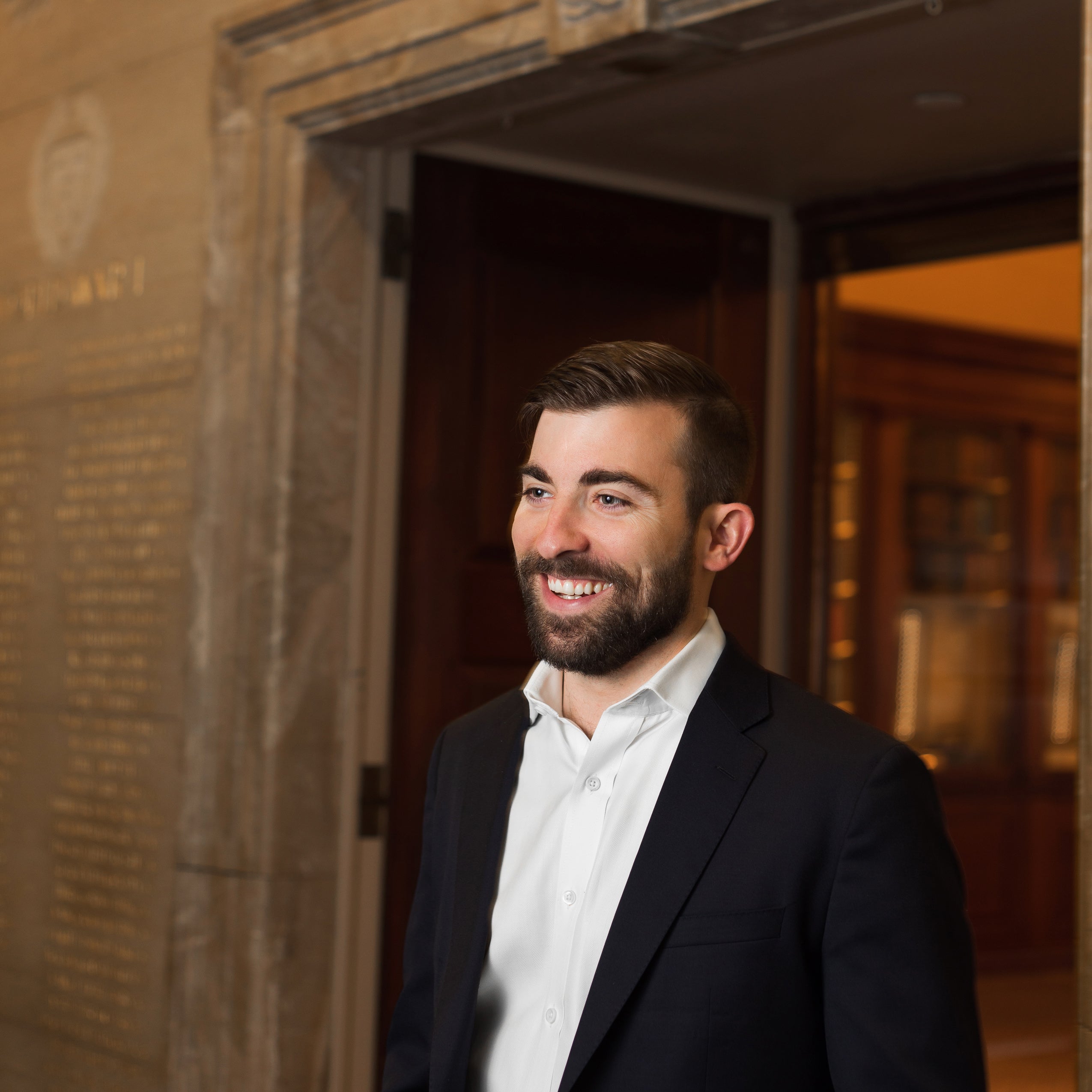At the age of 19, Logan E. Leslie JD/MBA ’19 participated in hundreds of combat missions in Iraq, searching for deadly IEDs and enemy combatants as a cavalry scout in the U.S. Army and a member of the vaunted 101st Airborne Division—and one of the youngest-ever graduates of the Army Ranger School. Upon returning from Iraq, he joined the elite U.S. Special Forces, better known as the “Green Berets,” trained as a combat diver, and led U.S. and foreign Special Forces soldiers on combat missions in Iraq and Afghanistan. Awarded the Bronze Star Medal and two Army Commendation Medals for exemplary combat leadership, Leslie rose quickly through the ranks: He was selected for promotion to Sergeant First Class at 24 years old, seven years ahead of his cohort, and later promoted to Master Sergeant at 30, ten years ahead of his cohort.
Leslie, who had decided at the age of 14, in response to the terrorist attacks of 9/11, that he would enlist as soon as he turned 17, loved military service and planned to spend his lifetime in it. But when he and his wife Erica were expecting their first child, Lila, now 7—they’ve since had another daughter, Scarlett, 5—Leslie made the difficult decision to leave active duty. The extreme poverty and failed institutions he witnessed in Afghanistan were “heartbreaking” and spurred him to “want to do something else, to serve in a different way,” he says.
In 2012, he left active duty and matriculated at Harvard College, although he remains in the Army National Guard and plans to stay “until they kick me out. I want to be the oldest enlisted guy in the Army.” At the college, from which he graduated with honors in just three years, Leslie was a Pat Tillman Military Scholar, selected from more than 7,500 applicants as one of 60 exceptional student veterans based on a record of achievement, leadership, and commitment to public service.
With the goal of further developing his critical thinking and leadership skills, Leslie entered the joint program at HLS/HBS in 2015. While there, Leslie, who carries top-secret security clearance from the U.S. Department of Defense, was hand-picked by General Mark A. Milley, Chief of Staff of the U.S. Army to serve as a special projects officer on his staff in order to “advise [him] on contemporary and future security challenges,” and “to provide [him] with historical context, innovative thinking, and non-traditional strategic insights.” It was a “once-in-a-million opportunity,” says Leslie, who was the first enlisted person to serve in that role, and one of the few to do so part-time (he commuted back and forth to the Pentagon from Cambridge.) Milley described Leslie as among the “top 2% of Master Sergeants I’ve rated in 39 years of service; unlimited potential.”
Now, as he graduates from the joint program, Leslie is focusing that unlimited potential on a business he launched last year, Northern Rock, Inc., which is banking on the profitability of an undervalued asset: the leadership ability of military veterans. Northern Rock, which will be based in Atlanta, Georgia, is a holding company that buys, operates, and grows middle-market companies involved in infrastructure construction and maintenance, including in the area of renewable energy, in order to provide management opportunities for military veterans. Leslie has recruited and leads a “robust team” of advisors, operating partners, investment associates, and military veterans that serve as candidates for executive positions in acquisitions.
“When I left active duty, I transitioned out of the service with a bunch of very senior leaders … guys and gals I really respected, who had led 1,000-plus-person organizations, and yet the job market wasn’t there for them,” explains Leslie, who has been running Northern Rock from the Harvard Innovation Labs in Cambridge. “They would get jobs where they led five or six people, which is a fine path but systemically it’s a tremendous waste of leadership abilities.”
Leslie himself was seeking the sense of purpose he’d found in the military. “I realized I would need to start something with the values and the mission I hold dear,” he says, adding that many veterans encounter a tough transition from military service because “it’s not just a job, it’s an identity.”
“My goal is to build a huge business where we can hire as many vets as possible,” says Leslie, who has raised a significant amount of money from investors and is exploring acquisitions around the country. “My second-order goal, from an investor’s standpoint, is that we’re investing in veteran leadership, which is a classic undervalued asset. In the market, if you invest in that and make money, then others will too, and prices [for that asset] rise.”
“It’s been really difficult, there are ups and downs, but I’m really impressed with the team we have now and I know we are going to do well,” he says. “I truly believe that to help veterans you need to employ them,” and that the private arena is better poised for this than nonprofits.
“Harvard has a really special place in my heart,” says Leslie, who says he’s enjoyed experiencing three different schools at the university. “They took a huge chance on me. It was life-changing to go from spending my entire adult life, at that point, in the military, and to be in Afghanistan and then to come to school and set myself on a totally different course.”
The law school, where he was enrolled in the U.S. Attorney Clinic in Boston, working on organized crime prosecutions, “is intellectually rigorous and full of passionate people. I may not necessarily agree with the prevailing sentiments but I always respect the passion.”
Read a Q&A with Logan Leslie on the Harvard Law School J.D. Admissions blog.
